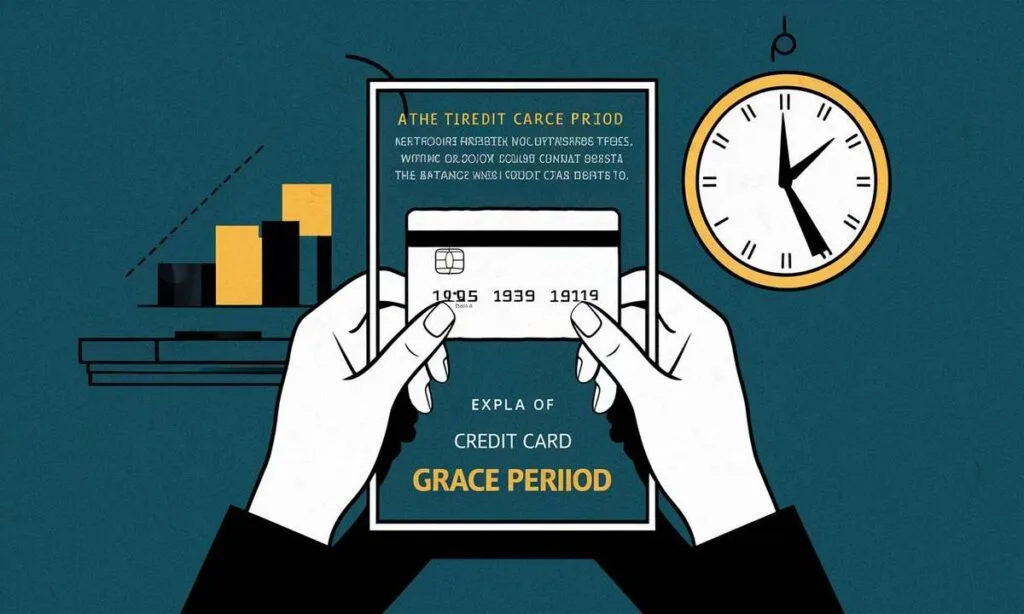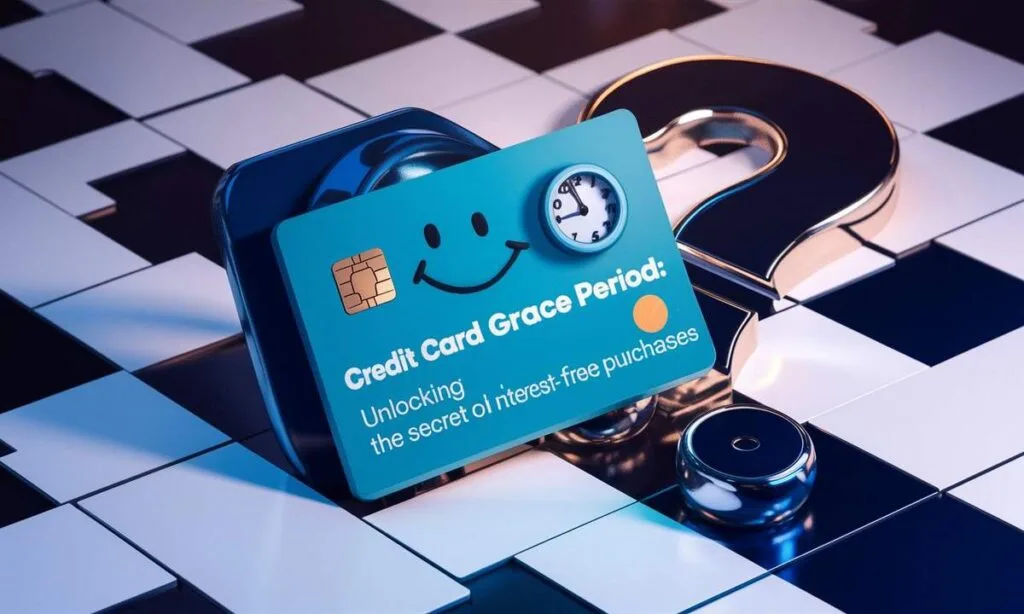A Credit Card Grace Period: The Basics
A credit card grace period is the time window during which you can pay off your credit card balance without incurring interest. Typically, this period begins on the last day of your billing cycle and ends on your payment due date. If you pay the full balance within this timeframe, you can avoid interest charges altogether. Understanding this crucial feature of your credit card can save you a significant amount of money over time, making it an essential part of responsible credit management.

The History and Evolution of Grace Periods in Credit Cards
Grace periods weren’t always a standard feature of credit cards. Initially, credit card issuers charged interest from the moment a purchase was made. However, as competition among issuers intensified, grace periods were introduced as a way to attract more customers. Over the years, these grace periods have evolved, often becoming more consumer-friendly. Today, most credit cards offer a grace period of at least 21 days, providing consumers with a valuable tool to manage their finances without accruing unnecessary debt.
Why Understanding Grace Periods Is Crucial for Credit Card Users
Misunderstanding or neglecting the details of your card’s grace period can lead to unexpected interest charges, even if you believe you’re managing your card responsibly. For instance, carrying a balance from the previous month can eliminate your grace period, meaning new purchases will start accruing interest immediately. Therefore, a thorough understanding of how your grace period works is key to maximizing your credit card’s benefits and minimizing costs.

How Credit Card Grace Periods Work
The Timing of Grace Periods: When Do They Begin and End?
The grace period starts on the closing date of your billing cycle and lasts until your payment due date, usually 21 to 25 days later. During this period, if you pay your full balance, you avoid interest charges on your purchases. If your payment is partial or late, however, the grace period disappears, and interest accrues from the transaction date.
How Grace Periods Interact with Billing Cycles
Your billing cycle and grace period are intricately linked. The end of a billing cycle marks the beginning of the grace period. Any new purchases made during the current billing cycle will not incur interest if the previous cycle’s balance is paid in full by the due date. Understanding this interaction helps you plan your payments and purchases effectively to maximize the benefits of your grace period.
The Role of Payment Due Dates in Grace Periods
The payment due date is the last day of your grace period. Missing this date results in not only late fees but also the loss of your grace period, leading to interest charges on new transactions. It’s critical to keep track of this date to maintain the interest-free benefits of your grace period.
The Connection Between Grace Periods and Interest Charges
Interest charges are directly tied to whether or not you utilize your grace period. Paying your full balance within the grace period ensures that no interest is charged on your purchases. However, carrying a balance from one month to the next results in interest being applied to all new transactions, effectively nullifying the grace period until the balance is fully paid off.
Types of Credit Card Transactions and Grace Periods
Grace Periods on Purchases: What to Expect
Most credit cards offer grace periods on standard purchases. This means that if you pay off your entire balance by the due date, you won’t pay interest on those purchases. However, this only applies if your balance is paid in full each month. If not, the grace period is void, and interest is charged from the purchase date.
Cash Advances and Grace Periods: Are They Included?
Cash advances typically do not come with a grace period. Interest on cash advances starts accruing immediately, often at a higher rate than regular purchases. Additionally, cash advances may be subject to extra fees, making them an expensive option if not paid off quickly. Understanding this difference can prevent costly mistakes.
Balance Transfers: Do Grace Periods Apply?
Grace periods on balance transfers vary by credit card issuer. Some cards may offer a grace period on balance transfers, especially during promotional periods, while others may charge interest from the transfer date. It’s important to read the terms and conditions carefully to understand how interest will be applied to transferred balances.
Special Promotions and Their Impact on Grace Periods
Promotional offers, such as 0% APR for a limited time, may temporarily extend your grace period on certain types of transactions. However, these promotions often come with conditions, such as forfeiting the grace period if a payment is missed. Be sure to understand how these offers work to avoid unexpected charges.

The Importance of Paying in Full
How Paying Your Balance in Full Affects Your Grace Period
Paying your balance in full each month allows you to take full advantage of your credit card’s grace period. By doing so, you avoid paying interest on your purchases, effectively making your credit card a free short-term loan. Consistently paying in full is the most straightforward way to keep your credit costs down.
The Consequences of Carrying a Balance: Losing Your Grace Period
Carrying a balance from month to month means losing your grace period. Without a grace period, new purchases start accruing interest immediately, leading to higher costs over time. This can quickly spiral into significant debt if not managed carefully.
Partial Payments: How They Influence Grace Periods
Partial payments can be misleading; they reduce your outstanding balance but do not restore your grace period. Interest will continue to accrue on any remaining balance, and new purchases will not benefit from a grace period. It’s crucial to understand that only full payment of the statement balance reinstates your grace period.
TAKING in the Fine Print
Reading the Terms and Conditions: Grace Period Clauses
The fine print of your credit card agreement contains critical information about how grace periods are applied. These clauses outline the conditions under which the grace period applies and what actions can cause it to be forfeited. Careful review of these terms can prevent misunderstandings and unexpected charges.
How Different Credit Card Issuers Define Grace Periods
Credit card issuers may have slightly different definitions of grace periods. While the general concept is the same, specifics like the length of the grace period and the types of transactions covered can vary. It’s important to compare these details when choosing a credit card to ensure it aligns with your financial habits.
Common Misconceptions About Grace Periods
Many consumers mistakenly believe that grace periods apply to all credit card transactions or that they can avoid interest by making partial payments. In reality, the grace period only applies if the previous balance is paid in full, and not all transactions, such as cash advances, are covered. Dispelling these myths can lead to more informed credit card use.
How to Maximize the Benefits of a Grace Period
Strategies for Always Paying on Time
Setting up automatic payments, scheduling reminders, and aligning payment dates with your income can help ensure you never miss a payment due date. These strategies can help you maintain your grace period and avoid costly interest charges.
Using Grace Periods to Avoid Interest Charges
By understanding and using your grace period effectively, you can make purchases without paying interest. Plan to pay off your entire balance within the grace period each month to keep your borrowing costs at zero. This strategy is particularly useful for managing large purchases over short periods.
Planning Your Purchases Around Grace Periods
Strategically timing your purchases at the beginning of your billing cycle gives you the maximum time to pay them off before interest is applied. This approach allows you to leverage the full benefits of your grace period, providing a longer window to manage your finances without incurring interest.
What Happens When You Miss a Payment?
The Impact of Late Payments on Your Grace Period
A single late payment can have significant consequences, including the immediate loss of your grace period. Once lost, interest will accrue on any remaining balance and new purchases, making it more expensive to carry a balance.
How Late Fees and Penalties Affect Future Grace Periods
Late fees and penalties not only increase your immediate costs but can also affect your eligibility for future grace periods. Some credit cards may suspend your grace period for several billing cycles after a late payment, compounding the financial impact of missed payments.
Reestablishing Your Grace Period After a Missed Payment
To regain your grace period after missing a payment, you must pay your balance in full for two consecutive billing cycles. During this time, all new purchases will accrue interest from the transaction date, making it imperative to get back on track quickly.
Grace Periods and Different Types of Credit Cards
How Grace Periods Vary Between Credit Card Types
Not all credit cards offer the same grace period terms. While most standard cards provide a grace period on purchases, others, like those designed for low credit scores or secured cards, may offer shorter or no grace periods. Understanding these differences is essential when selecting a credit card that suits your needs.
Comparing Grace Periods on Reward Cards vs. Low-Interest Cards
Reward cards often come with more favorable grace periods, encouraging users to maximize their rewards without incurring interest. On the other hand, low-interest cards may have shorter grace periods, reflecting their focus on offering lower interest rates rather than maximizing grace periods.
Store Credit Cards and Their Approach to Grace Periods
Store credit cards often have different grace period policies, particularly during promotional financing offers. These offers may extend grace periods on certain purchases but impose strict conditions. It’s crucial to understand these terms to avoid unexpected interest charges after the promotional period ends.
The Relationship Between Grace Periods and Your Credit Score
How Timely Payments During the Grace Period Influence Your Credit Score
Paying within the grace period helps maintain a positive payment history, a critical factor in your credit score. Consistently paying off your balance during the grace period demonstrates responsible credit use, which can significantly boost your score over time.
The Long-Term Credit Score Benefits of Utilizing Grace
Periods
Using your grace period effectively not only saves you money but also contributes positively to your credit score. Over time, this responsible behavior can lead to better credit offers, lower interest rates, and more favorable loan terms, creating a positive financial cycle.
The Potential Credit Score Impact of Losing Your Grace Period
Losing your grace period due to late payments can negatively impact your credit score. Interest charges increase your debt, and missed payments can lead to derogatory marks on your credit report, making it harder to obtain favorable credit terms in the future.
Common Questions About Credit Card Grace Periods
Do All Credit Cards Offer Grace Periods?
While most credit cards offer grace periods on purchases, some do not, particularly cards aimed at consumers with poor credit or those with low-interest rates. It’s important to verify whether a grace period is included before applying for a card.
Can You Extend Your Grace Period?
Grace periods are typically fixed and cannot be extended. However, some issuers may offer flexibility in payment due dates, which can provide more time to pay your balance in full. It’s worth asking your issuer if this option is available.
What Happens to Your Grace Period if You Return a Purchase?
If you return a purchase, the transaction is typically credited back to your account, and your balance is adjusted accordingly. However, the grace period terms remain unchanged, so it’s essential to continue managing your payments to avoid interest charges.
BOTTOM LINE
Recap: The Importance of Understanding and Utilizing Grace Periods
Credit card grace periods are a powerful tool for managing debt and avoiding interest charges. By understanding how they work, when they apply, and how to maintain them, you can significantly reduce your borrowing costs and improve your financial health.
Final Tips for Mastering Credit Card Grace Periods
Stay organized, make timely payments, and always aim to pay your balance in full to maximize the benefits of your grace period. These habits will help you avoid unnecessary interest charges and keep your credit score healthy.
Encouraging Responsible Credit Card Use Through Grace Periods
Utilizing your grace period effectively is a cornerstone of responsible credit card use. By making informed decisions and managing your payments wisely, you can enjoy the benefits of credit cards without falling into debt.
Frequently Asked Questions (FAQs)
How does a credit card grace period work?
A credit card grace period is the time between the end of your billing cycle and the due date for payment. If you pay your full balance within this period, you avoid interest charges on new purchases. However, if you carry a balance from the previous month, interest starts accruing from the purchase date.
Do all credit cards have a grace period?
Not all credit cards offer a grace period. While most standard credit cards do, some, particularly those aimed at consumers with poor credit or those designed as low-interest cards, may not have a grace period at all.
How long is the typical grace period on a credit card?
The typical grace period on a credit card is between 21 to 25 days, depending on the issuer. This period starts at the end of your billing cycle and ends on your payment due date.
What happens if I pay my credit card after the grace period?
If you pay your credit card after the grace period, you will likely incur interest charges on the unpaid balance. Additionally, your next billing cycle may not have a grace period, meaning new purchases will start accruing interest immediately.
Can I lose my credit card grace period?
Yes, you can lose your credit card grace period if you carry a balance from month to month. When a balance is carried over, the grace period is forfeited, and interest accrues on new purchases from the transaction date.
How can I maximize my credit card grace period?
To maximize your credit card grace period, always pay your balance in full by the due date. This ensures that new purchases won’t accrue interest. Additionally, try to time your purchases early in the billing cycle to give yourself more time to pay them off.
Does carrying a balance affect my grace period?
Yes, carrying a balance affects your grace period. If you don’t pay your full balance by the due date, your grace period for the next billing cycle is eliminated, and interest begins to accrue on new purchases from the transaction date.
Is there a grace period for cash advances on a credit card?
No, there is typically no grace period for cash advances. Interest on cash advances usually begins accruing immediately from the date of the transaction, and they often come with higher interest rates than regular purchases.
How does the grace period impact interest charges on my credit card?
The grace period allows you to avoid interest charges on your purchases if you pay your balance in full by the due date. Without a grace period, interest would start accruing immediately on all transactions, increasing your overall costs.









